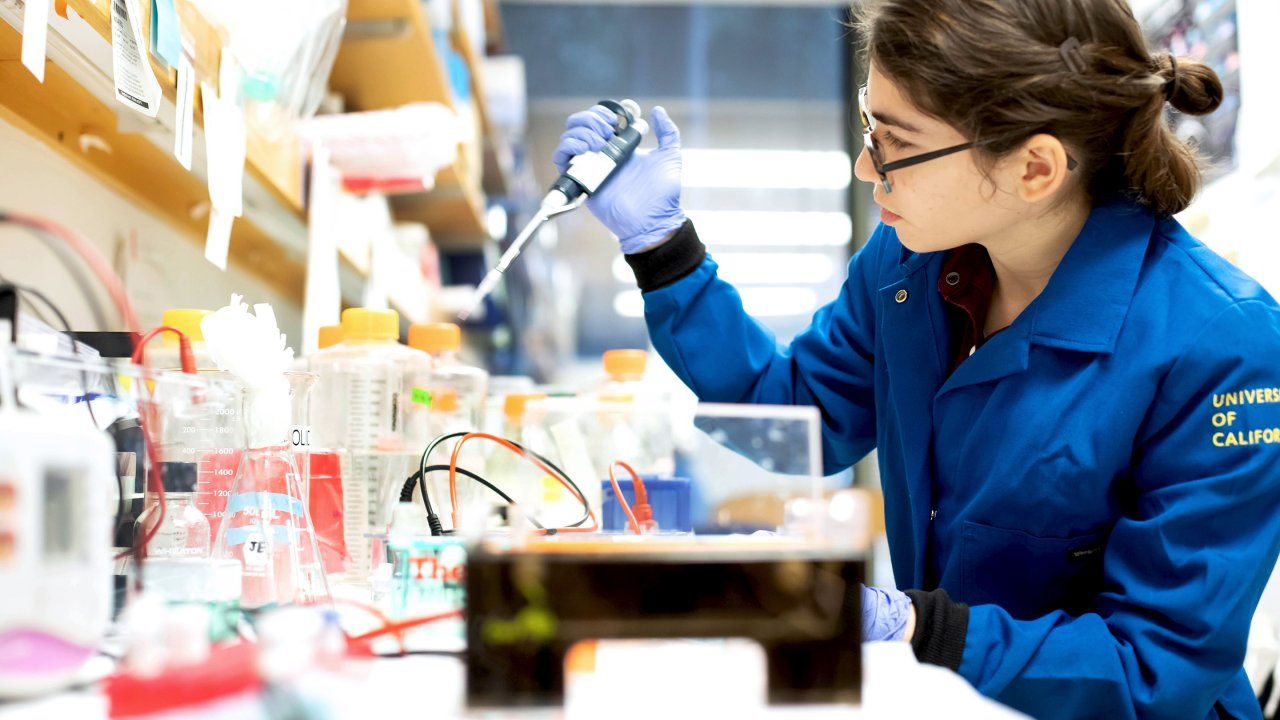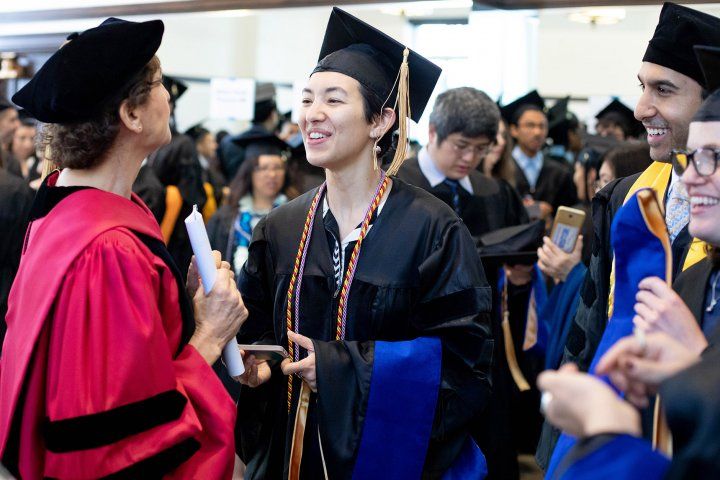$50M in Philanthropy Elevates Basic Science Research
Inspired by Researchers’ Heroic COVID Response, Anonymous Donor Boosts Two Trailblazing Programs At UCSF

Clara Herrera, a Tetrad student in the department of Biochemistry, works in the Engel Lab at UCSF in March 2020. The Tetrad Graduate Program is supported by the Discovery Fellows program. Photo by Susan Merrell
Basic science initiatives – that is, those scientific inquiries that aim to deepen our fundamental understanding of natural phenomena – are integral to the identity and mission of UC San Francisco. This fundamental research helps to propel the University’s work beyond present-day challenges to build a foundation of new knowledge for the future, however, financing this essential work remains difficult. While the National Institutes of Health funds basic science in the U.S., universities and scientists, including those in PhD programs, must compete for increasingly scarce opportunities. Non-governmental investments are uncommon because the benefits of basic-science breakthroughs are typically realized in decades rather than years.
Fortunately, over the course of its recent fundraising campaign, UCSF has now accrued a $100 million endowment for the UCSF Discovery Fellows Program, which supports basic science PhD students. It also secured a $25 million endowment to name the Sandler Program for Breakthrough Biomedical Research (PBBR), which finances bold scientific projects that challenge conventional wisdom and do not fit within the narrow constraints set by traditional grant makers. Most recently, the university received a $50 million bequest intention that will benefit both of these trailblazing initiatives. The bequest donor, a longtime supporter of both programs who wishes to remain anonymous, sees tremendous value in the efforts of graduate students and faculty members pursuing basic science pilot projects and wants to ensure the future of these initiatives.
“The Discovery Fellows Program and the Sandler Program are two of our flagship programs here at UCSF,” notes Keith Yamamoto, PhD, special adviser to the Chancellor for science policy and strategy and former faculty director of the Sandler Program. Yamamoto, who has worked closely with the donor, acknowledges the exceptional opportunities that will be afforded by this gift.
The Discovery Fellows Program and the Sandler Program are two of our flagship programs here at UCSF.
“When the bequest is realized, the funding will go to the programs’ areas of greatest need,” he says. “It is important to the donor that this gift provide the utmost flexibility. The prospect of such significant future support will continue to motivate our scientists and spur the kind of unique, invigorating research that is synonymous with our culture.”
The anonymous donor was particularly inspired by current COVID-19-related research funded through the Sandler Program. According to the Sandler Program’s current director, Joe DeRisi, PhD, the donor wanted to provide a ray of hope for the people working on the front lines and toiling in their labs to combat the virus.
“This person was inspired by our scientists hoping to make a difference in the lives of millions of people affected by this disease,” DeRisi says. “The Sandler Program enables researchers to approach long-standing, intractable problems from a new perspective while also allowing them to pivot in real-time to address things like COVID-19. I’m so pleased by the support for this hugely important work, and by the assurance that someone will be an advocate for their efforts long into the future.”

Tess Veuthey (center), a graduate student in Neuroscience and a Discovery Fellow, talks with Elizabeth Watkins (far left), PhD, before receiving her Doctor of Philosophy degree in a commencement ceremony in 2019. Photo by Susan Merrell
This same spirit of innovation animates the dozens of PhD students in the basic and biomedical sciences who are named as Discovery Fellows each year and who serve as ambassadors for basic science education. The Fellows – whose areas of expertise include fields such as biochemistry, cell biology, and neuroscience, among many others – are selected for their leadership potential, excellence in research, communications skills, and community-mindedness. Over the past eight years, the Discovery Fellows program has become the largest endowed program for PhD students in the history of the 10-campus University of California system, providing essential resources for students to expand their horizons and conduct lifesaving research.
“The Discovery Fellows are an impressive collection of brilliant young scientists, and we are grateful for this support for the future of the program,” says Elizabeth Silva, PhD, interim dean of the UCSF Graduate Division and vice chancellor of student academic affairs. “It is wonderful and gratifying to have the support of likeminded individuals who appreciate the enormous value of this type of education and research.”
The anonymous bequest intention comes on the heels of a $25 million gift from Sir Michael Moritz, KBE, and Harriet Heyman to endow the Sandler Program for Breakthrough Biomedical Research (Sandler Program). Moritz and Heyman also were the founding donors to the Discovery Fellows Program.
Ultimately these investments promise to revolutionize research and further existing work in UCSF’s already strong basic-science enterprise. “These gifts will make a huge difference to the future of science and research at UCSF,” Chancellor Sam Hawgood, MBBS, says. “They will help us to continue our history of relentlessly attacking problems, questioning assumptions, and shattering barriers to arrive at radical solutions. I am enormously proud of our community for inspiring people to support these scientists’ unconventional ideas, and of each of these donors for their faith in the future of our University. I look forward to seeing what more we can accomplish together.”
The University of California, San Francisco (UCSF) is exclusively focused on the health sciences and is dedicated to promoting health worldwide through advanced biomedical research, graduate-level education in the life sciences and health professions, and excellence in patient care. UCSF Health, which serves as UCSF’s primary academic medical center, includes top-ranked specialty hospitals and other clinical programs, and has affiliations throughout the Bay Area.